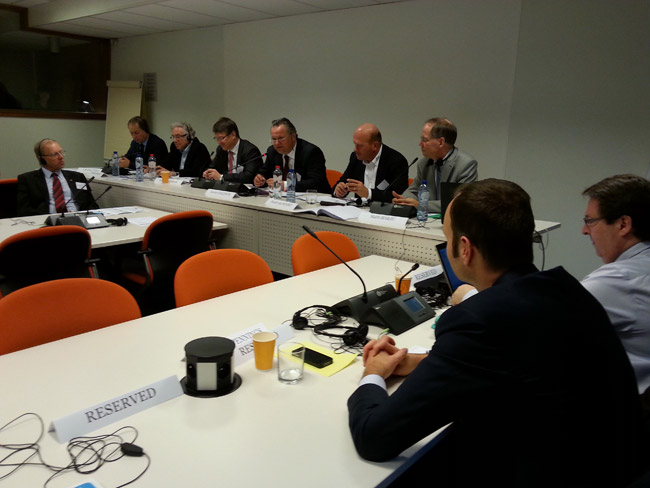
The Cogeca Presidency Business Forum is an event which brings European cooperatives together to discuss their business strategies.
The second 2022 Cogeca Presidency Business Forum is planned to focus on what effect economic, social and governance (ESG) communication and sustainability labelling under the Sustainable Food System initiative will have on agri-cooperatives, ways in which this can result in added value for agri-cooperatives, and also the importance of marketing and communication in raising greater awareness of the contributions agri-cooperatives make to sustainability across Europe.
The Forum will take place on the afternoon of Wednesday 30th November, between 14:30 and 18:00 in Brussels.
The Forum will provide a forum for discussion of the impact of the ongoing crisis on the agri-food sector and also allow agri-food cooperatives, to share possible responses and solutions to these issues.
Driving questions
The aim of the Forum is to address the following broad questions on the issue of sustainability labelling:
- What will be the impact of the Sustainable Food Systems initiative on agri-cooperatives?
- How do agri-cooperatives communicate their contributions to social and environmental sustainability, and can they do more?
- To what extent are consumers aware of the “cooperative difference”? Is the cooperative brand a key response to create emotional connection with consumers and communicate the farmers ownership element of these enterprises?
- In what ways can sustainability labelling generate added value, and how can agri-cooperatives best exploit this?
- What is the role of innovation and new technologies in sustainability labelling?
Agenda:
14:30 – 14:40 – Opening speech by the Cogeca Presidency Business Fora Coordinator, Mr. Christian Høegh-Andersen
14:40 – 15:20 Keynote speech
14:40-15:00 – Keynote speech
15:00-15:20 – Q&A session
15:20-15:50 – Coffee break
15:50- 17:50 – Moderated roundtable discussion
17:50-18:00 – Closing remarks from the Cogeca President, Ramón Armengol
Format of the Forum
This Forum will be an in-person event, and will be structured around a keynote presentation section, followed by a moderated roundtable. The keynote presentations are intended to provide perspectives on – ESG sustainability labelling from the side of policymaking and industry. This will be followed by a moderated roundtable, which is aimed at providing further exchanges and discussion on this topic. This will give an opportunity to figures within the cooperative movement to discuss potential best-practices and experiences with sustainability labelling, including on how to communicate and brand their products to generate added value.
The roundtable will be structured to include a variety of cooperative perspectives from different sectors and different countries, to provide a diverse and engaging discussion on the role of agri-cooperatives in ESG sustainability labelling
Background – why this theme
The Farm to Fork strategy, as envisaged by the Commission, is intended to promote sustainable food consumption, in line with the wider European Green Deal. Within the strategy, it was communicated that: “a sustainable food system will be essential to achieve the climate, biodiversity and other environmental objectives of the Green Deal, while improving the incomes of primary producers and reinforcing the EU’s competitiveness”.
Accordingly, under the Farm to Fork framework, the Sustainable Food Systems initiative has emerged. According to the Commission, this initiative will lay down general principles and objectives, together with the requirements and responsibilities of all actors in the EU food system. More specifically, it will regulate on minimum mandatory requirements for the sustainability of food products, sustainability labelling of food products, rules for public procurement of food, as well as governance and monitoring.
Sustainability labelling focuses on the need to ensure consumers (as well as other actors in the food supply chain) are given clear, transparent, and accurate information on the environmental and social impact of food products, allowing them to make informed decisions on their purchases.
Agri-cooperatives focus on long-termism over short term profit and work to achieve efficient use of available resources. On top of this, they place a critical social role in rural communities, including ensuring provision of vital services as well as offering employment opportunities.
In addition, one of the key roles of agri-cooperatives is to improve the position of farmers in the value chain by strengthening their bargaining power. In practical terms, an agri-cooperative may secure the application of better contractual terms for their farmer-members, such as higher selling prices compared to current market prices, long-term contracts and/or regular orders, advance payments, and additional guarantees whose inclusion in supply contracts would be more difficult to achieve for individual farmers.
In terms of incentives with a social or human dimension, cooperatives are characterised by their democratic functioning and ownership, which over time helps consolidate and maintain trust in horizontal cooperation. Moreover, todays’ market research clearly shows that consumers in the agri-food chain are less impressed with brands alone, with more concern focusing on price, customer experience and corporate social responsibility. In this context a 2019 study of Eurobarometer indicates that while EU consumers trust farmers, they have much less trust in distributors, retailers, and processors. It is therefore essential to communicate the farmers’ ownership to foster a trust-based connection with the consumer that is based on trust.
For these reasons, agri-cooperatives are not only well placed to meet the social, economic, and environmental sustainability needs of our food systems but may also be able to achieve added value for their products over those of other producers through effectively making use of a sustainability labelling system.





